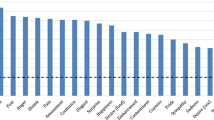Abstract
Children’s understanding of emotion and its constructivist links with pretend play is of increasing interest as an element of cognition. This article examines emotional development and pretend play using basic foundations of psychoanalytic and learning theories, and several understandings about emotional development. Also, this paper explains emotional development and pretend play through interactive levels of expression, control and modeling of emotion, and emotional intelligence. Through each of these levels, emotional development can be practiced and enhanced. To be a competent and positive person, children use pretend play as a learning opportunity to deal with their feelings, to have empathy for other’s feelings, and to develop emotional health.
Résumé
La compréhension enfantine de l’émotion et son lien constructiviste avec les jeux à faire semblant suscitent actuellement un intérêt croissant en tant qu’éléments interactifs cognitifs. Cet article se propose d’examiner le développement émotionnel et les jeux à faire semblant en utilisant les principles de base des théories psychanalytiques et cognitives, ainsi que certains éléments se rapportant au développement émotionnel. En outre, cette étude explique le développement émotionnel et les jeux à faire semblant à travers des niveaux interactifs d’expression, la ma"trise et le façonnage des émotions, ainsi que l’intelligence émotionnelle. A travers chacun de ces niveaux, le développement émotionnel peut être réalisé et accru. Pour se sentir compétent et se présenter une image positive de lui-même, l’enfant utilise les jeux à faire semblant afin d’apprendre à maîtriser ses émotions, d’avoir de l’empathie envers les autres, et de développer son bien-être émotionnel.
Resumen
El entendimiento por parte de los niños de las emociones y su nexo constructivista con los juegos de roles hace crecer el interés en los elementos cognitivos interactivos. El presente art’culo examina el desarrollo emocional y los juegos de roles por medio del uso de teor’as psicoanal’ticas y pedagógicas de demostrada estabilidad. Además, explica el desarrollo emocional y el “juego de roles” tanto en los distintos niveles de expresión, control y modelación de las emociones como en la inteligencia emocional. Desde cada uno de estos niveles se puede practicar y favorecer el desarrollo emocional. Aparte de ser una oportunidad de aprender a tratar con sus sentimientos, entender los de los demás y desarrollar una salud emocional, los niños utilizan el juego de roles con el fin de aprender a ser una persona independiente y positiva.
Similar content being viewed by others
References
Brown, J.R. & Dunn, J. (1996). Continuities in emotion understanding from three to six years.Child Development, 67, 789–802.
Caulfield, R. (1996). Social and emotional development in the first two years.Early Childhood Education Journal.24(1), 55–58.
Cicchetti, D. & Hesses, P. (1993). Affect and intellect: Piaget’s contributions to the study of infant emotional development. In R. Plutchik & H. Kellerman (Eds.),Emotion: Theory, research, and experience: Vol. 2. Emotions in early development (pp. 115–170). New York: Academic Press.
Dodge, K.A. & Garber, J. (1991). Domains of emotion regulation. In J. Garber & K.A. Dodge (Eds.),The development of emotion regulation and dysregulation (pp. 3–11). New York: Cambridge University Press.
Dunn, J., Bretherton, I. & Munn, P. (1987). Conversations about feeling states between mothers and their young children.Developmental Psychology 23, 132–139.
Englemann, S. & Bereiter, C. (1966).Teaching disadvantaged children in the preschool. Englewood Cliffs, N.J.: Prentice-Hall.
Erikson, E.H. (1950).Childhood and society. New York: Norton.
Erikson, E.H. (1959).Identity and the life cycle. New York: Norton.
Freud, S. (1964). New introductory lectures on psycho-analysis. In J. Strachey (Ed. and Trans.),The standard edition of the complete psychological works of Sigmund Freud. (Vol. 22). London: Hogarth Press. (Original work published 1933)
Greenberg, L.S. (1996). Allowing and accepting of emotional experience. In R.D. Kavanaugh, B. Zimmerberg, & S. Fein (Eds.),Emotion: Interdisciplinary perspectives (pp. 315–336). New Jersey: Lawrence Erlbaum Associates.
Grolnick, W.S., Bridges, L.J., & Connell, J.P. (1996). Emotional regulation in two-year-olds: Strategies and emotional expression in four contexts.Child Development, 67, 928–941.
Hyson, M.C. (1994).The emotional development of young children: Building an emotion-centered curriculum. New York: Teachers College Press.
Izard, C.E. (1991).The psychology of emotions. New York: Plenum.
Johnson, J.E., Christie, J. & Yawkey, T.D. (1987).Play in early childhood development. New York: Harper Collins.
Malatesta, C.Z. (1988). The role of emotions in the development and organization of personality. In R.A. Thompson (Ed.),Socioemotional development (pp. 1–56). Lincoln: University of Nebraska Press.
Mayer, J. D. & Salovey, P. (1997). What is emotional intelligence? In P. Salovey, & D. J. Sluyter (Eds.),Emotional development and emotional intelligence (pp. 3–31). New York: Basic Books.
Piaget, J. (1965).Play, dreams and imitation in childhood. New York: Norton.
Piaget, J. (1985).The equilibration of cognitive structures, the central problem of intellectual development. Chicago: University of Chicago Press.
Skinner, B.F. (1982).Skinner for the classroom, selected papers. Champaign, Ill: Research Press.
Wieder, S. & Greenspan, S.I. (1993). The emotional basis of learning. In B. Spodek (Ed.),Handbook of research on the education of young children (pp. 77–87). New York: MacMilan.
Author information
Authors and Affiliations
Rights and permissions
About this article
Cite this article
Kwon, J.Y., Yawkey, T.D. Principles of emotional development and children’s pretend play. IJEC 32, 9–13 (2000). https://doi.org/10.1007/BF03169017
Issue Date:
DOI: https://doi.org/10.1007/BF03169017




